Dental Implants – Raleigh, NC
The Best Substitutes for Natural Teeth
You can trust all the tooth replacement options here at Lake Boone Dentistry Raleigh. Whether you pick one kind or another, our team will ensure you get amazing results. Still, the fact remains: dental implants in Raleigh stand out from the other choices. These posts embody the gold standard of tooth replacement, acting more like natural teeth than dentures or dental bridges do. You can learn more about them by reading below or by booking a visit to our office.
Why Choose Lake Boone Dentistry Raleigh for Dental Implants?
- Partners with Local Specialists
- Skilled & Experienced Dentists
- Caring & Gentle Dental Team
What Are Dental Implants?

In essence, dental implants are tooth-sized posts made of durable titanium. Dentists design them to act as substitutes for the roots of missing teeth.
Dental implants work better than dentures or dental bridges due to their placement method. Rather than set them over the guns, dentists place them directly in your jaw’s empty sockets. This approach lets the implant posts fuse with (and stimulate) your jawbone’s surrounding tissue, causing them to become permanent parts of your mouth. The implants can then support their abutments (i.e., metal connectors) and the final restoration.
The 4-Step Dental Implant Process

While every dental implant treatment plan is customized to meet our patients’ unique needs, every journey will consist of four fundamental steps: the initial consultation, dental implant placement, osseointegration, and the attachment of your final restorations. Some patients may also require preliminary treatments, like a bone graft or sinus lift, but these are necessary only on a case-by-case basis. To learn more about the four-step process of getting dental implants in Raleigh, contact our team today!
The Initial Consultation
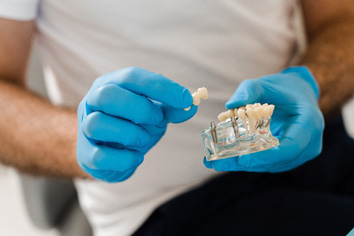
The first step of your dental implant journey is an in-depth consultation with our dentists in Raleigh. Our team will capture diagnostic images to review details that will help us determine if you’re a good candidate, like your jawbone density. Based on the images and a thorough examination of your mouth, your dentist will develop a treatment plan for you so you know what to expect throughout the journey. In some cases, preliminary treatments like a bone graft or sinus lift may be necessary before we can move forward with dental implant surgery.
Dental Implant Surgery

Our team is partnered with local specialists, allowing you to receive top-tier, reliable care during one of the most important parts of your treatment. To place the dental implants, your specialist will create a small window in the top of the gumline that will allow them to secure the titanium posts within the jawbone. Typically, it takes about 30 minutes to place each dental implant, and this procedure is completed under dental sedation for your comfort.
Osseointegration & Healing

After your dental implant placement, you’ll undergo a process called osseointegration, which takes between three and six months. During this time, your dental implants will naturally fuse with your jawbone. This will provide your replacement teeth with an unwavering and strong foundation to be attached to. Your gums will also heal in the two weeks following your procedure. Many of our patients feel well enough to return to work within one to two days after their surgery.
Abutment Attachment & Restoration

After osseointegration is complete, small metal connector pieces called abutments will be attached to the top portion of your implant posts. Impressions will then be made of your dental implants that will be sent to our dental laboratory that we work with. There, master lab technicians will create beautiful, lifelike replacement teeth that our team will attach to your dental implants once they’re sent to our practice.
Benefits of Dental Implants

Thanks to their design, dental implants offer more perks than dentures or dental bridges do. They thus represent the gold standard of tooth replacement, with dentists placing 500,000 of them yearly. It’s only natural – patients love how the posts can do things that other restorations can’t! You also don’t need to take our word for it; we’ll gladly outline the benefits of dental implants. Just keep reading to learn about them in detail, or consider calling our office.
Day-to-Day Benefits
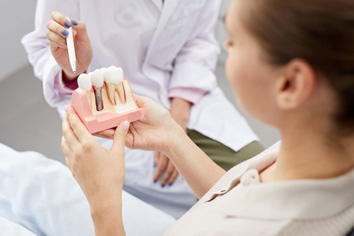
As you’d expect, dental implants’ day-to-day benefits are the most apparent ones. These include upsides like:
- Beautiful Looks – Since dental implants have porcelain surfaces, they look incredibly lifelike and blend well with your smile. Your peers won’t even notice that the posts aren’t “real” teeth.
- Higher Confidence – As they restore your full and gorgeous grin, dental implants will greatly boost your confidence. The restorations should leave you reassured of your good looks, especially in social settings.
- Easy Eating & Speaking – Because dental implants fuse with your jaw, they restore most (if not all) of your bite force and don’t slip or fall. That means they help you chew and speak as usual.
- Little Maintenance – Compared to dentures or dental bridges, dental implants are low-maintenance. You can keep them stable with twice-daily brushing, once-daily flossing, and mouth rinses, no creams or adhesives needed.
Health Benefits

You should also note dental implants’ health-related benefits. By getting them, you’d enjoy:
- A Healthier Mouth – Untreated smile gaps can lead to cavities, gum disease, and similar issues. Thankfully, dental implants fill them when they restore your grin.
- Tooth Support – Your other teeth may tilt and fall out if you don’t treat your tooth loss. That said, dental implants would prevent this outcome by filling your smile’s gaps.
- A Stronger Jaw – When someone has missing teeth, their jaw will slowly erode from a lack of stimulus. Still, dental implants prevent (and reverse) such erosion once placed.
- Better Nutrition – Dental implants broaden your meal choices, given that they restore your bite’s force. Therefore, they help you get crucial vitamins and minerals.
Long-term Benefits
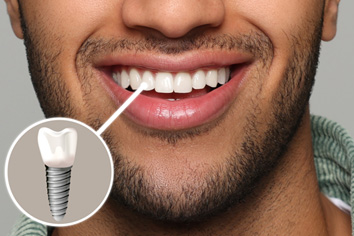
Over time, dental implants display several long-term benefits. These are:
- Ensured Success – Dental implants often succeed, assuming they’re placed by a qualified dentist. It’s to the point that the posts’ ten-year success rate is 98%!
- Lasting Results – Due to their materials, dental implants can potentially restore your smile for a lifetime. Even an average one will work for 15-20 years, while well-maintained posts can last 30 years or more.
- Cost-effective Care – Despite their price, dental implants can save you money in the long run. Their lasting effects (see above) ensure they don’t need much repair or replacement work. Indeed, they let you keep funds otherwise spent on follow-up dental care.
Who Dental Implants Can Help

Dental implants can help nearly anyone with missing teeth, no matter how many were lost. They’re just as able to fill large smile gaps as small ones. That said, you need healthy gums and a dense jawbone to qualify for them. These traits allow your mouth to support the implants after they’re placed. If your gums or jaw are too weak, implant posts will quickly come loose and suffer an early failure.
Missing One Tooth
If you only lack one tooth, a single dental implant and crown should restore your smile. This pair can be placed fairly quickly and often lasts longer than a dental bridge. Also, dentists won’t need to alter your nearby teeth to set it up. An implant post only needs to fuse with your jaw to stay in place.
Missing Multiple Teeth
Should you lose multiple teeth, an implant bridge could suit you pretty well. This device uses two dental implants (not dental crowns) to support its place in your mouth. In other words, it doesn’t rely on nearby natural teeth (i.e., abutments) like a regular dental bridge does. The treating dentist won’t have to remove any enamel to place it.
If the missing teeth weren’t adjacent, a partial implant denture is also an option.
Missing All Teeth
You ought to consider a full implant denture if you’ve lost (or soon will) all your teeth. Once set up, it can restore an entire arch with a few well-placed dental implants. An implant denture also doesn’t slip or fall like a regular one can, as its implants keep it steady. The minimal number of posts is set for the highest degree of stability.
Understanding the Cost of Dental Implants

At Lake Boone Dentistry Raleigh, we don’t dole out cookie-cutter treatment. It is customized to each person’s unique needs and smile. As a result, the cost for achieving the results will differ from patient to patient, and we won’t be able to estimate the cost in your case until we’ve had the opportunity to examine you in person. Once we have put together a dental implant treatment plan, we can share the financial details and go over your options.
Preliminary Treatments & Dental Implant Surgery
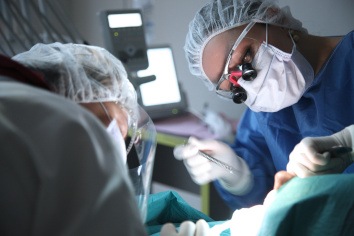
Do you require gum disease treatment, bone graft, or sinus lift? Preliminary treatments like these add more cost overall, but they also increase the chances of success and help those who wouldn’t otherwise qualify for dental implants.
The surgery itself will take place at a specialist’s office, which means they will communicate with you about the cost of the procedure and will be able to answer your questions about that part of the process.
The Parts of Your Dental Implant
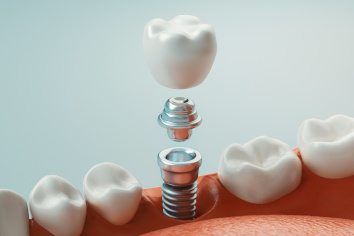
Implants consist of three parts: the post, abutment, and restoration. Just as different parts of a car have various brands and associated prices, the same is the case with dental implants. Available brands can have specific advantages and features that we’ll consider for your replacement teeth. Depending on what you need, we will select parts and let you know their different pricing if you are interested in a more itemized bill.
How Dental Implants Can Pay for Themselves

If you look only at the upfront cost of replacing teeth, dental implants clearly cost more than other options. However, consider that these prosthetic teeth can last significantly longer than traditional dentures or bridges. Instead of paying over and over again to replace your dentures about every five years, you could have replacements that don’t require substitution at all! In the long term, it’s common for dental implants to become the more cost-effective option.
Does My Dental Insurance Cover Dental Implants?

Although we are not in-network with insurance companies, we will gladly file claims for your reimbursement. Dental insurance plans can vary, so you’ll need to double check yours, but generally they don’t include benefits for dental implants or the placement procedure. However, certain aspects of your overall treatment might be covered. For instance, if you require a bone graft or gum disease treatment, it will likely be partially paid for by your policy. The restoration also is included in your benefits. When you come in for your consultation, we will try to clarify your insurance benefits, so you know exactly what cost you’ll pay out-of-pocket.
Making Dental Implants Affordable

If you are concerned about paying for dental implants, or if you have questions, be sure to talk to our team. We can discuss your options and get the financial details settled with you.
Maintaining & Caring for Your Dental Implants

Even though dental implants have an outstanding success rate of over 95%, they aren’t invincible—and it falls on you to properly care for your new smile on a daily basis. However, assuming you’re able to go about things the right way, your dental implants have the potential to serve you well for your entire life! It’s all about taking a proactive approach to your dental health; here’s what you need to keep in mind.
Make Oral Hygiene a Priority

Once your dental implants have healed, it falls on you to maintain their integrity by practicing excellent daily oral hygiene. Fortunately, dental implants don’t require any sort of specialized maintenance or products; you simply need to brush and floss your teeth every day, in addition to keeping up with your routine preventive checkups. Even though your dental implants themselves cannot decay, any remaining teeth or nearby tissues are still vulnerable to issues—and those issues will impact your implants!
Eat a Healthy Diet

With dental implants, it’s true that you’ll be able to enjoy a varied diet and eat all of your favorite foods. However, you should still try to make smart choices and avoid consuming excessive amounts of sugar and starches. Try swapping out potato chips, candy, and other junk food and sweets for hearty fruits and vegetables, lean proteins, leafy greens, and plenty of dairy products, since they’re chock-full of calcium. Foods that benefit your waistline can also benefit your oral health, creating a favorable environment for your implants moving forward!
Break Bad Habits

There are several bad habits out there that can directly impact your dental implants, so it’s important to reflect on your lifestyle and curb any that might harm your smile. One of the biggest ones to reconsider is smoking or using tobacco products; however, even things like biting your nails, chewing on pen caps or pencils, using your teeth as tools to open packaging, and chomping on ice cubes can prove disastrous for dental implants.
Protect Your Dental Implants

Bruxism, also known as teeth grinding, is a common condition that affects many patients unknowingly while they’re asleep. It can prove very harmful to dental implants since it can damage the restorations on top, while the excess pressure can affect the underlying posts in the jaw. This is why, if you suffer from bruxism, you should wear a nightguard to prevent potential harm to your implants. Similarly, if you play contact sports, every time you suit up and take the field, wear a protective mouthguard.
Schedule Regular Dental Checkups

Just because your dental implants replace your missing teeth doesn’t mean that they also replace the need for oral hygiene! While taking care of things with your toothbrush at home is important, it’s just as wise to maintain your biannual routine checkups and cleanings. During these appointments, Dr. Ricke will be able to examine your implants and ensure they look and function as they should and are free of problems. By addressing issues early on, you can ensure that your dental implants serve you well for decades to come.
Dental Implant FAQs
Does Getting Dental Implants Hurt?
If you’re wondering whether there is any pain experienced during the dental implant procedure, you aren’t the only one. The great news is that our team always administers a local anesthetic before we do anything to your mouth, that way you can be entirely pain-free throughout the process. Additionally, the human jawbone doesn’t have many nerve endings, so you’ll be even more likely not to experience discomfort during your appointment. The procedure itself shouldn’t hurt, but it’s normal to feel some mild soreness for several days afterward. Of course, this can be easily managed by taking prescribed/over-the-counter pain relievers as well as using a cold compress to alleviate swelling. If you notice any worsening or persistent discomfort, notify us so we can help.
How Long Do Dental Implants Last?
In many cases, dental implants can go for more than 30 years or even a lifetime, so long as you take good care of your smile. This means you’ll need to brush, floss, and rinse with mouthwash every day as well as schedule regular dental checkups and cleanings every six months. Before and after your surgery, our team will provide you with specific aftercare instructions so that you can improve the success of your results, which is another way to ensure greater longevity. Since your titanium posts will fuse to your jawbone like natural tooth roots, you should have an easier time maintaining your new pearly whites in the long run.
What Can Cause Dental Implants to Fail?
There is a very rare chance that dental implants can fail later on after being placed in the jawbone. If they do fail, it’s typically due to peri-implantitis or failed osseointegration. The former is a kind of periodontal disease that accumulates around and attacks the connective tissues in the gums and bones that keep the implant in place. It is generally caused by poor oral hygiene. Failed osseointegration is when the metal post does not properly fuse with the jawbone tissue. Other reasons for implant failure include chronic teeth grinding, tobacco use, certain medications, and particular health conditions. Our team can give you a guideline on ways to lower your risk of dental implant failure.
How Long Does it Take to Recover from Dental Implant Surgery?
This will generally depend on each patient’s situation and oral health, but in most cases, patients may need to take off one or two days after their dental implant surgery. The amount of time needed for recovery can also vary due to the number of metal posts that you’re receiving. The majority of the time, patients will schedule their surgery at the end of the week, or for both Thursday and Friday, so that they have the weekend for rest and healing. Generally speaking, it takes about 3-6 months for osseointegration to complete. While you shouldn’t have to worry about soreness after a few weeks, you’ll simply need to maintain great oral hygiene and follow your post-op instructions to ensure your results are successful.
